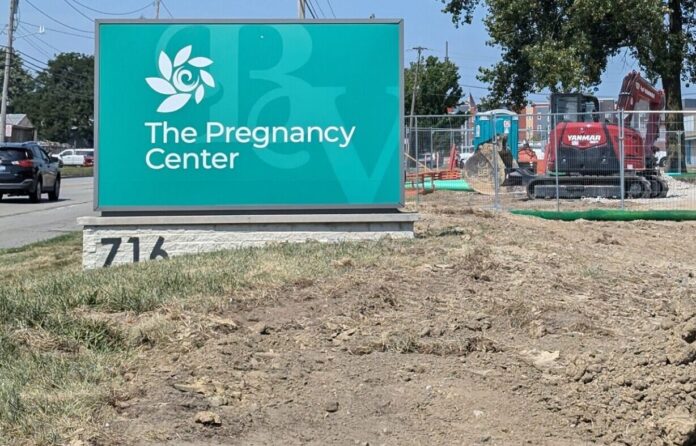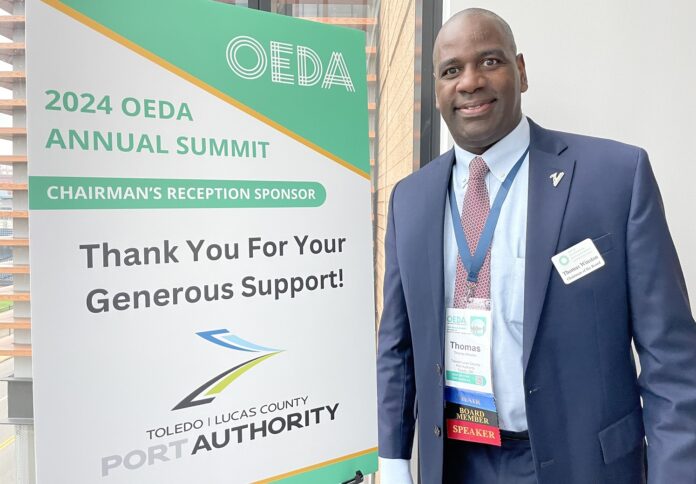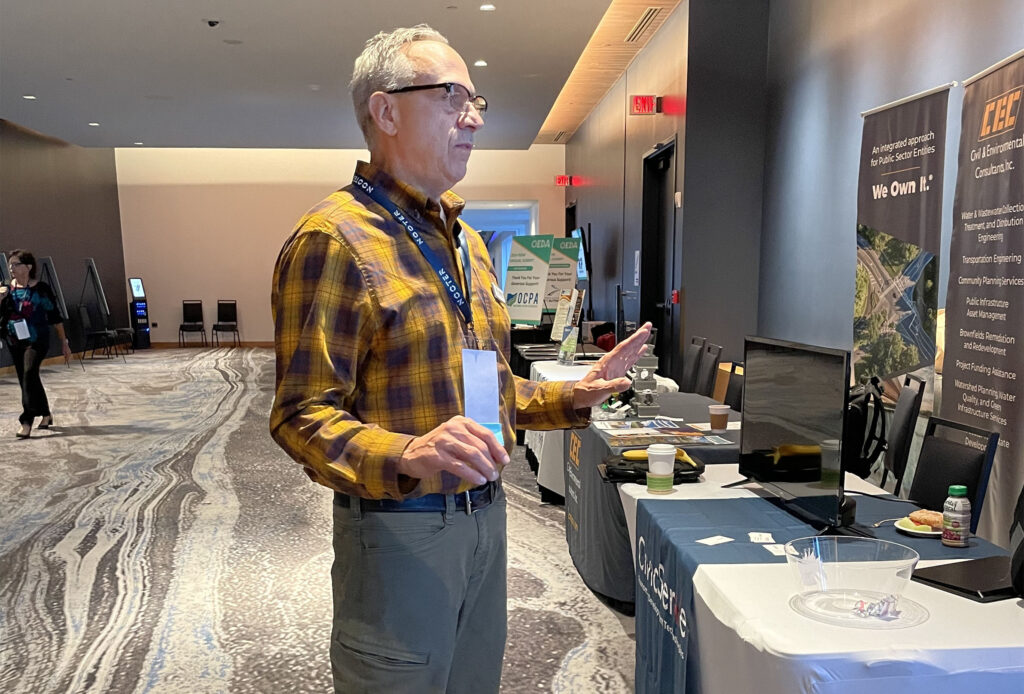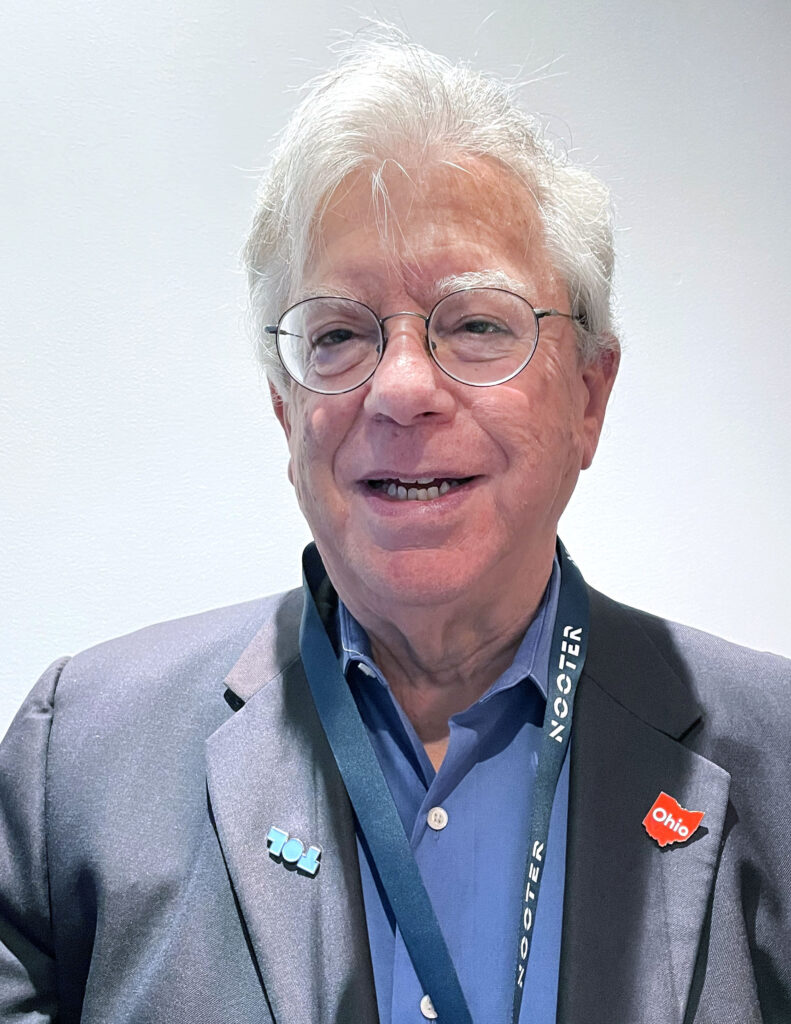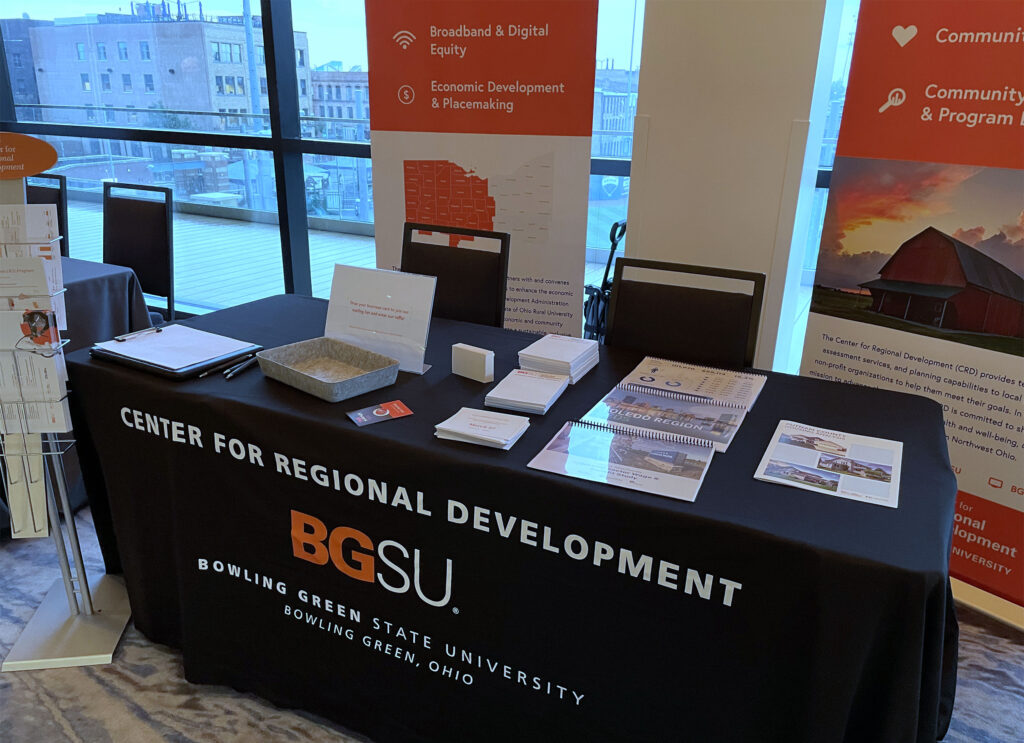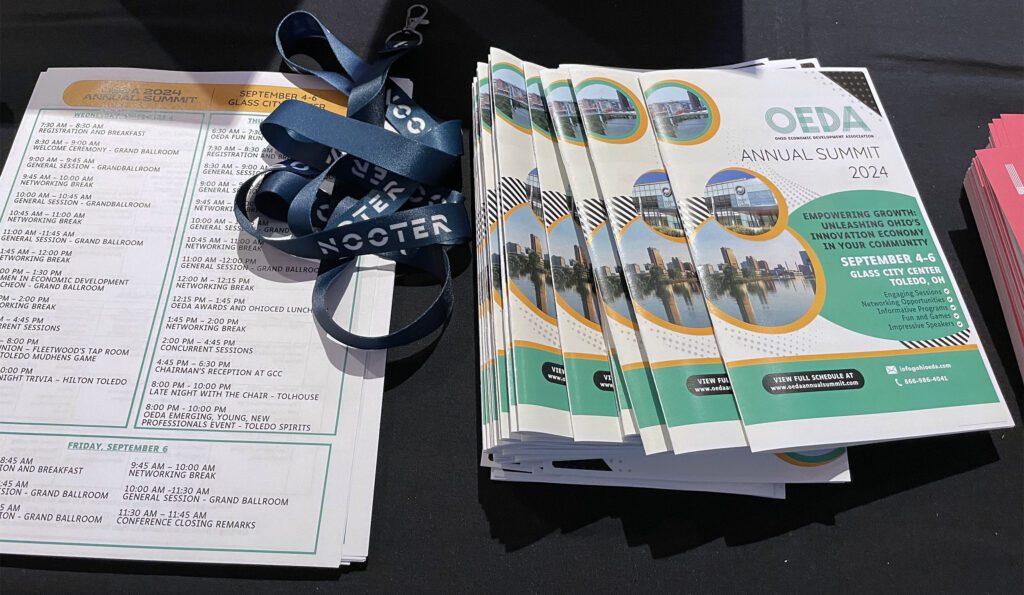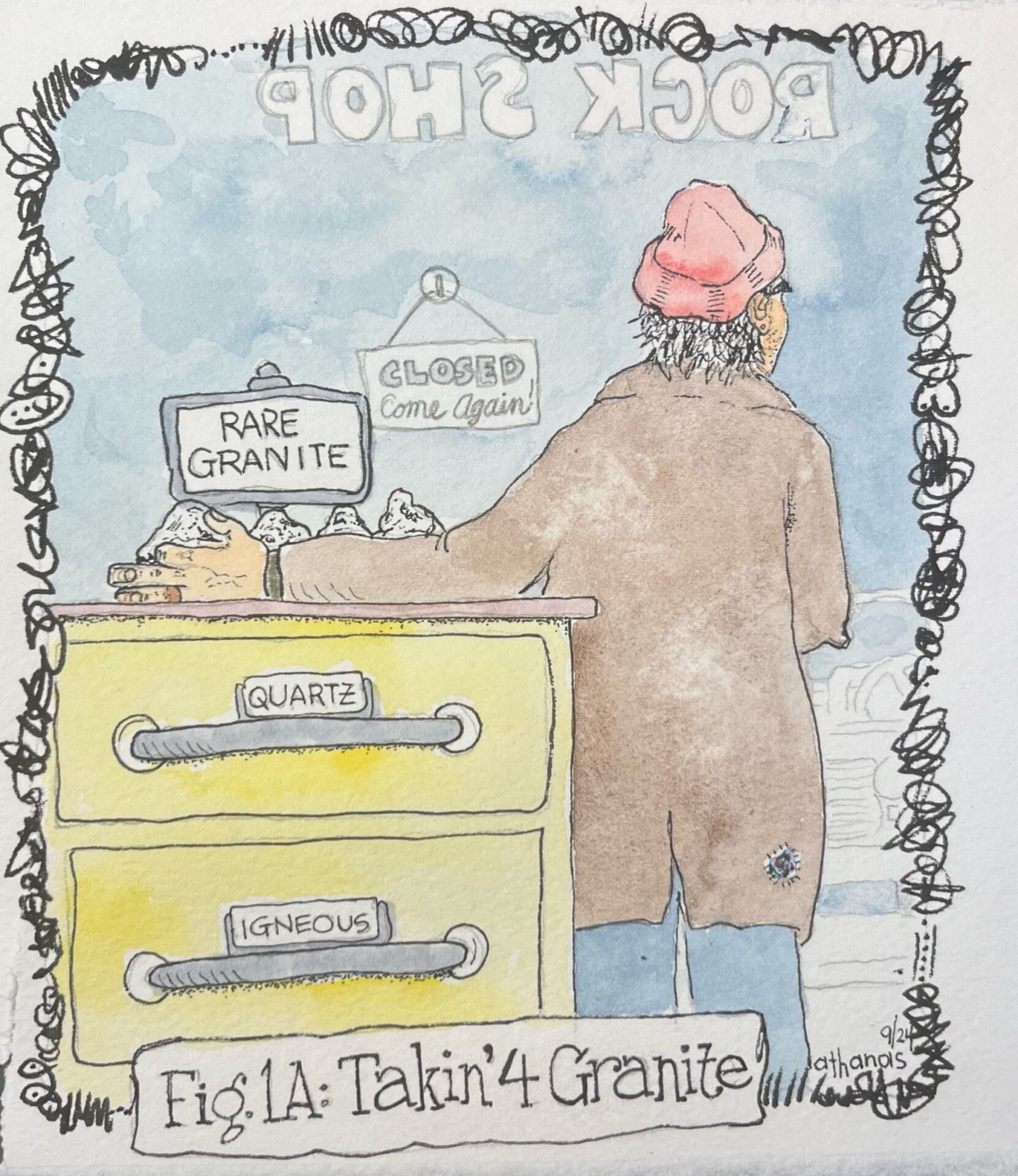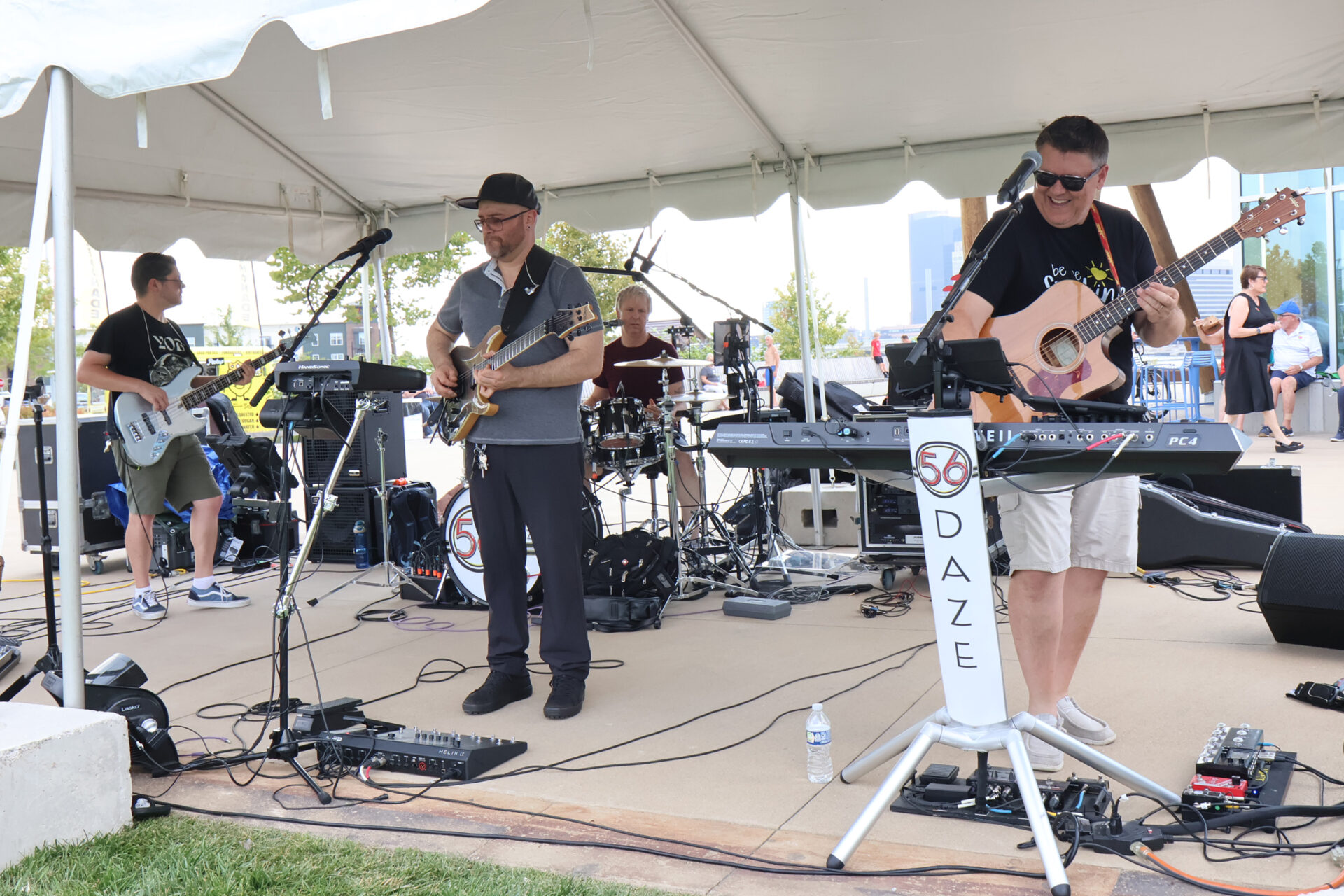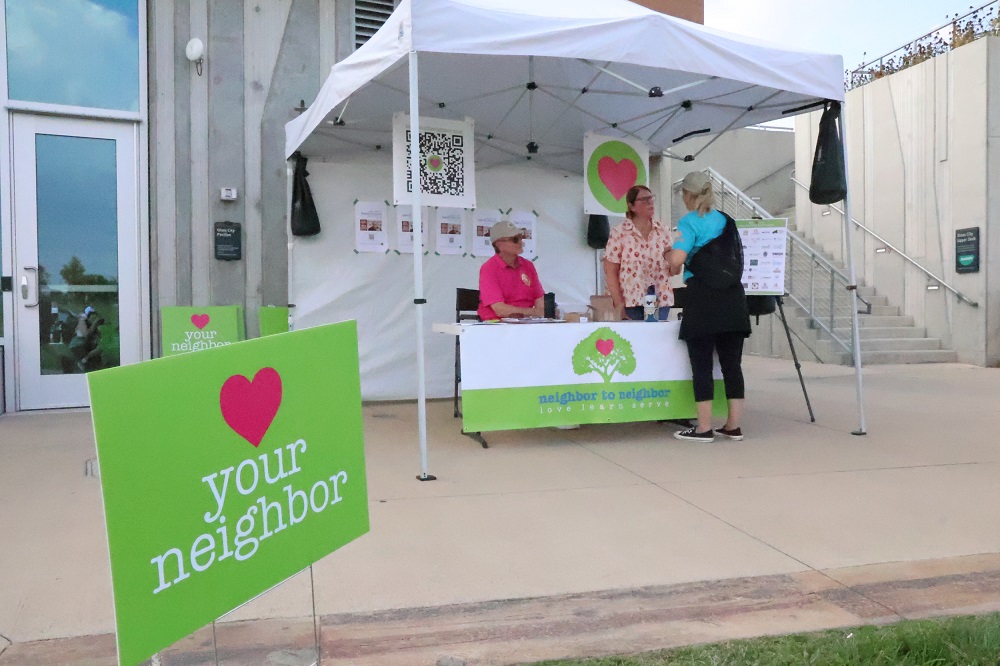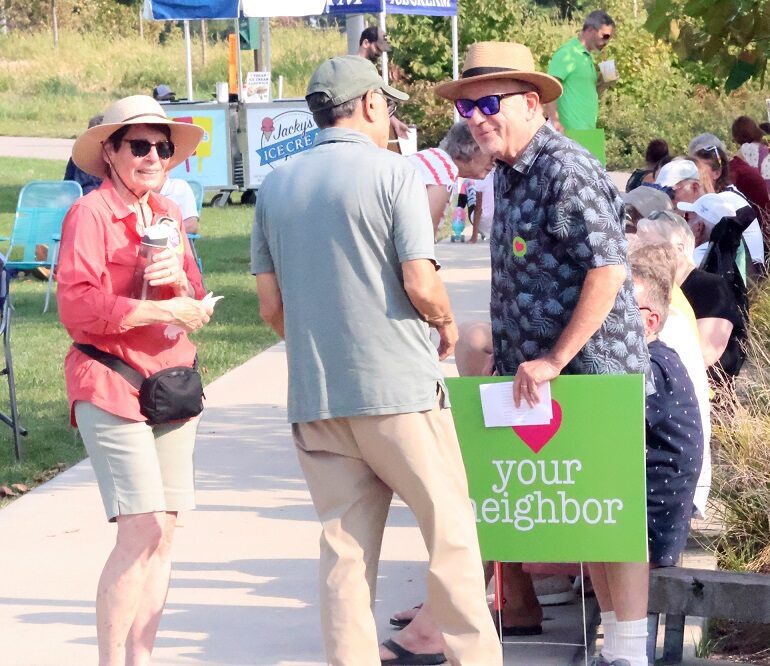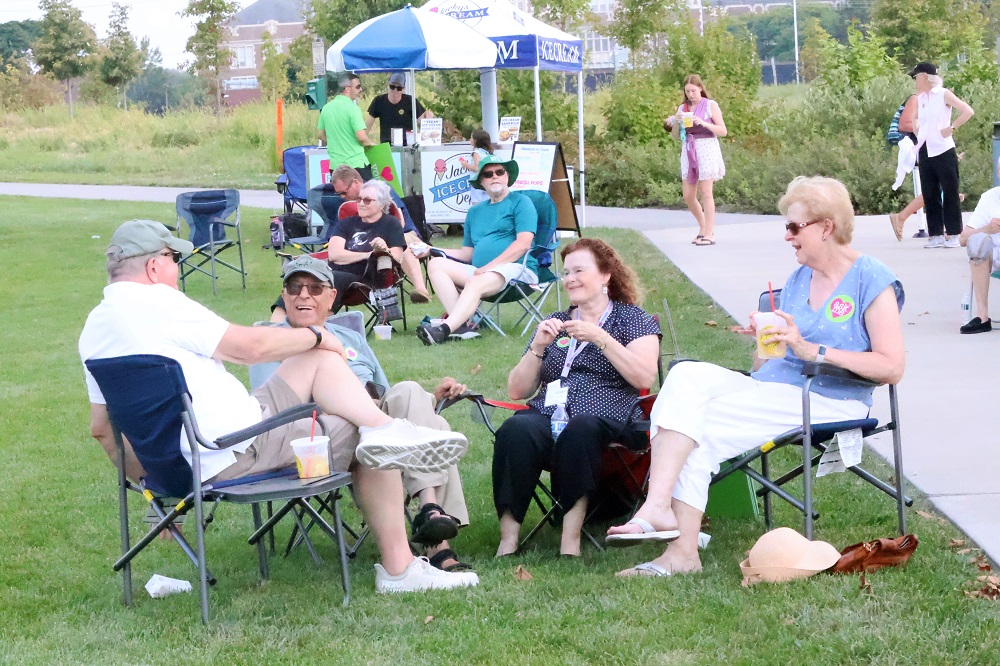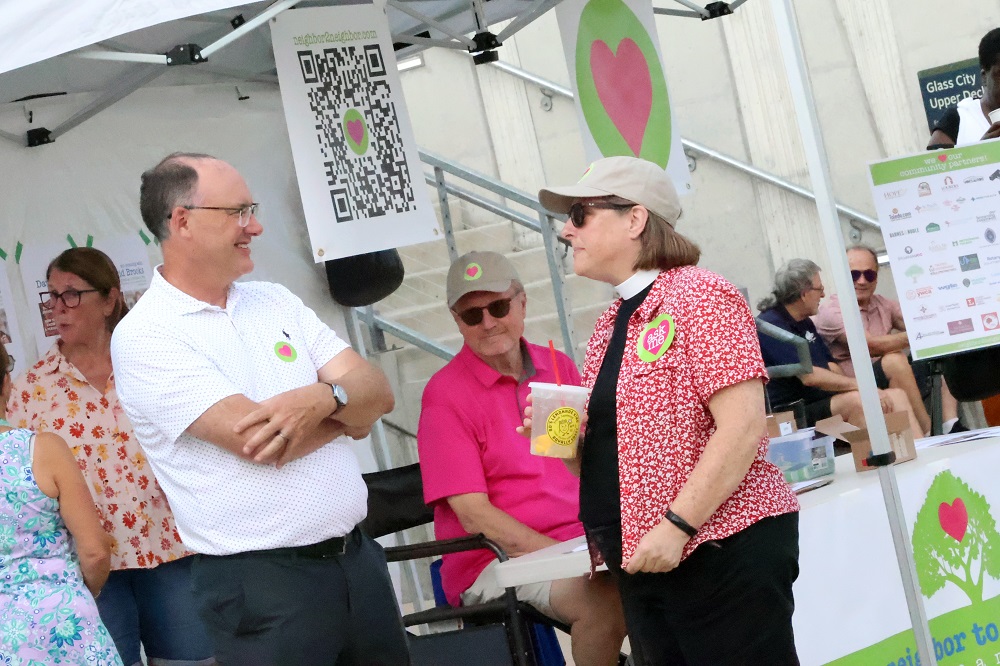Daily Dose | The Humorist
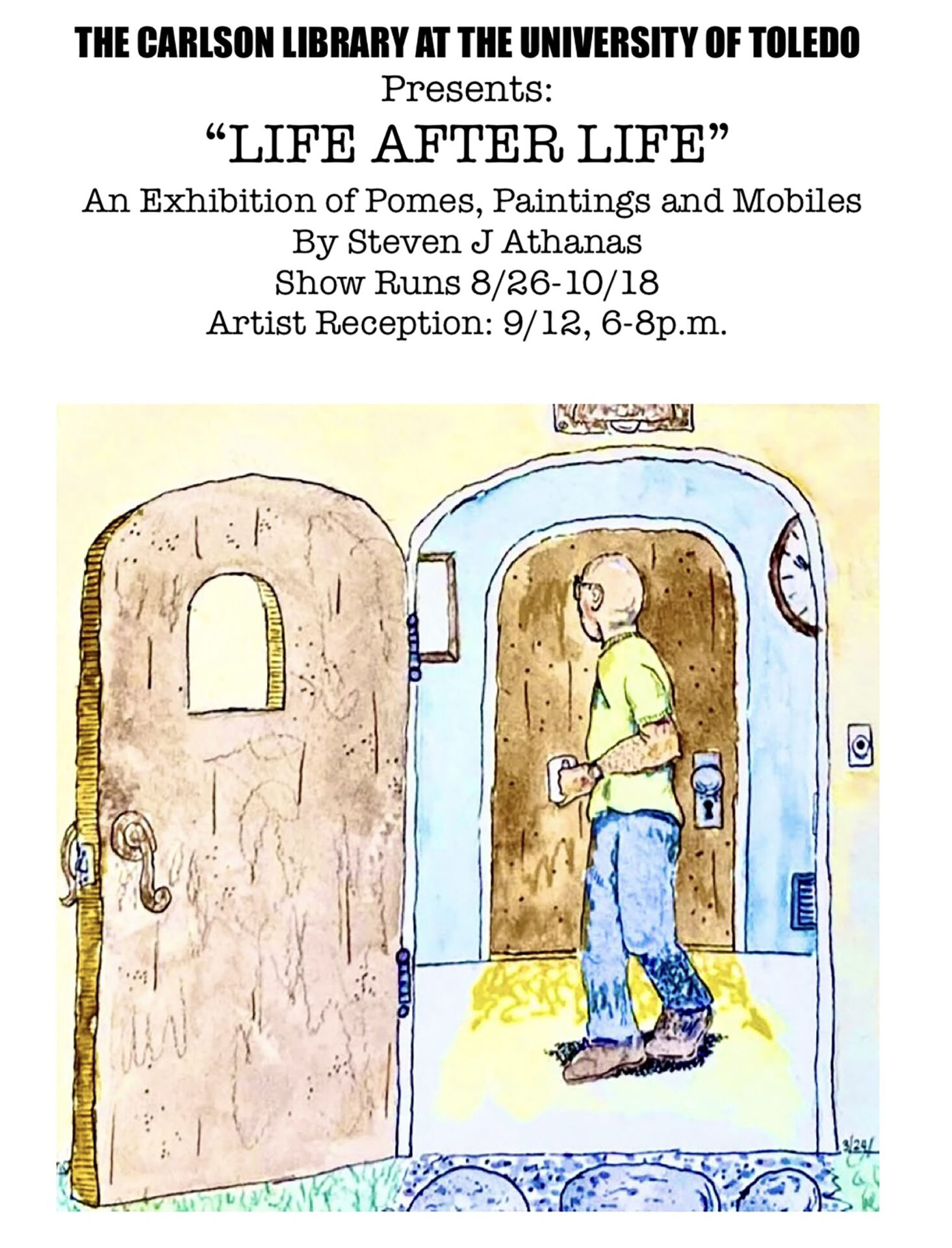

A Series: Reproductive care
Bella Vita Network is a local option in a post-Roe era
This is the first of a limited series. The Toledo Free Press will be reporting on stories about reproductive healthcare options and care for women in the Toledo area.
Story and photos by Erin Holden
TOLEDO – As we all should know by now, there are many different circumstances under which a woman might consider abortion. The question is, as the Ohio state law stands at this time, what are your options when you aren’t sure how to proceed?
For local women who aren’t established with an OB-GYN, the first step might be to do online research about her options in Toledo, and there is a lot to sift through.
The November 2023 election and the Heartbeat Bill
First, a little background on recent legislation. Senate Bill 23, also known as the Heartbeat Bill, became law in 2019, prohibiting abortion once there is detectable cardiac activity (the only exceptions are in the cases of rape and incest). That can be as early as six weeks.
After Roe v. Wade was overturned in 2022, it took effect. However, last November’s approval of Issue 1 put a halt to the six-week limit, enshrining the right to abortion up to the point of fetal viability. At this time, it is now legal to have an abortion up to 21 weeks and six days, though you have to receive parental permission if you are under the age of 18 (unless you can get a judicial bypass).
Exceptions for receiving an abortion after that gestational period include saving the pregnant individual’s life, or preventing other serious consequences to their health.
Abortion Access in Toledo
There is only one abortion clinic in Toledo: Toledo Women’s Center, which used to be more commonly known as Capital Care of Toledo. They do not perform procedural abortions at this time, but provide the abortion pill, per their website, at five weeks to 11.6 weeks gestation. They have a sister clinic in Cuyahoga Falls, Northeast Ohio Women’s Center, that provides procedural abortions from five to 16.5 weeks.
Outside of this local option, the abortion pill can be ordered from various websites and delivered to women who need it.
The Pregnancy Center
Once you get past the results for the single Toledo clinic that provides abortions, resources from Planned Parenthood, and so on, The Pregnancy Center comes up as one of the first-page options for anyone researching abortion in Toledo. They have extensive information about abortion regulations and are very clear that they themselves do not perform abortions.
The Toledo Free Press sat down with Savannah Marten, executive director of the Bella Vita Network, a nonprofit organization that operates The Pregnancy Center, to learn more about the center.
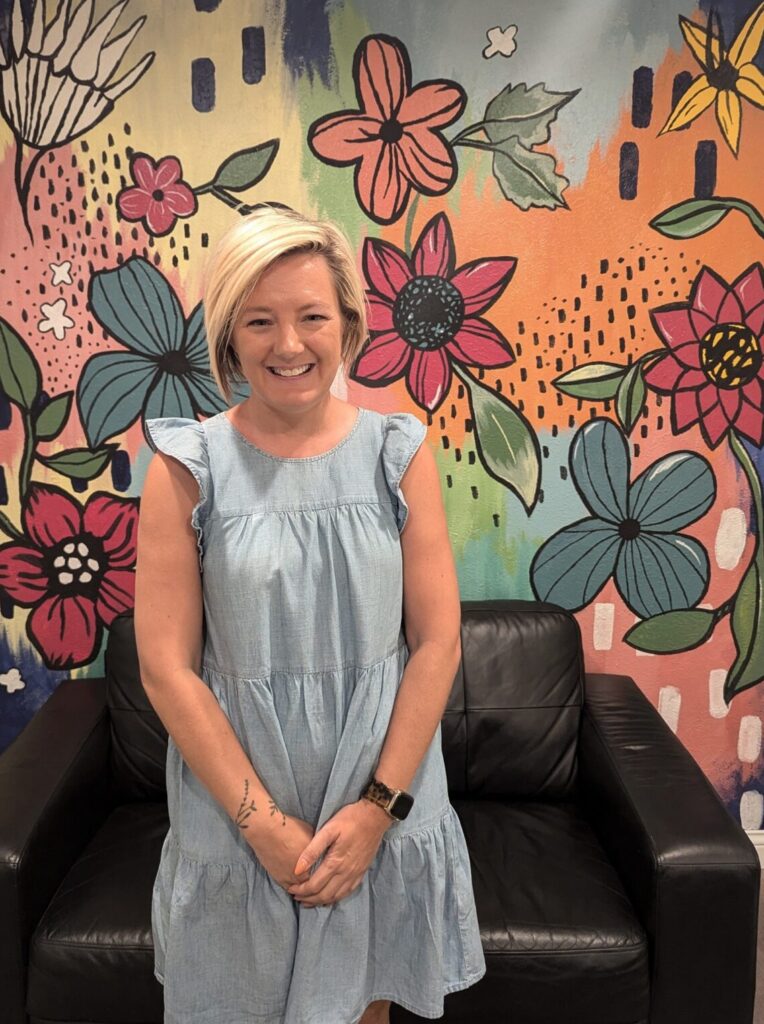
“We have what we would call a holistic assessment. We know that pregnancy affects a woman’s entire being, and I think when we look at the healthcare industry as a whole, it tends to be about how is this affecting this person physically?,” Marten explained.
“But it affects their relationships, their emotions, their jobs, their socioeconomic status … so the first thing we do is a holistic assessment that gauges where this woman is in all of these areas,” she said.
The services the Center provides are free and include information about abortion, pregnancy tests, a limited ultrasound, community support and referrals to help with the pregnant individual’s next steps, and pregnancy classes.
They even have resources for postpartum and beyond, like childcare, lactation consulting and necessary items from diapers to clothes. All of it is free, and the organization does not take government funding.
The Pregnancy Center website does not include any language like “prolife” or espouse any religious affiliation, but the Bella Vita Network (bellavita.org) is more direct. On the homepage, it states:
Bella Vita Network is a Christ-centered organization, transforming the prolife movement by collaborating with like-minded organizations to boldly provide sustainable solutions that empower and equip individuals and organizations to make abortion unthinkable in our community and country.
As a 501(c)(3) nonprofit, Bella Vita funds The Pregnancy Center, The Haven (a support organization for women who struggle with having had an abortion, as well as their partners), and Soul Purpose. The latter is an outreach program that focuses on abortion prevention through methods like “abstinence education” and “pro-life advocating” on college campuses (bellavita.org/outreach). The University of Toledo has a chapter.
Marten stresses that the Center trains their staff to be cognizant of biases, to inform patients of all options, including abortion, and to take a nonjudgemental approach to all intakes. She said she even hears from patients who decided an abortion was the best path, and that they appreciated the support they received at the Center while they grappled with their decision.
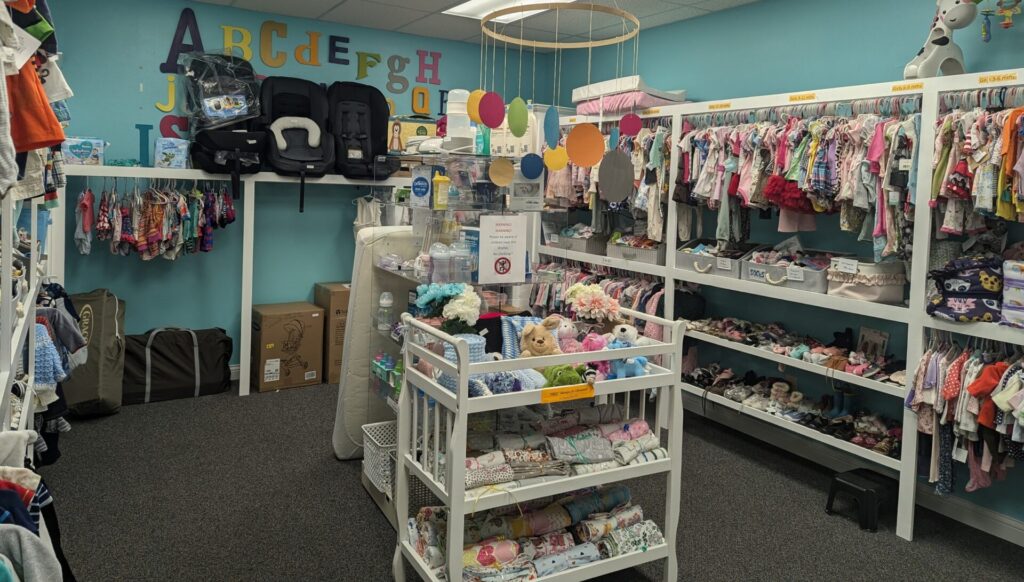

“They know that we’re a life-affirming organization,” Marten said, indicating their transparency. “They know that we’re a faith-based organization. They know that we don’t provide abortions. It’s on the website.”
When it comes to the language on the Bella Vita site, specifically the description on its homepage, Marten said, “We actually call that our brand positioning statement. The reason we call that ‘brand positioning’ versus ‘mission’ is that ‘position’ is a posture you take, whereas ‘mission’ is something you do. And we believe it’s such a massive conversation…that everyone, including us, are trying to get our arms around when we say that we want to make abortion unthinkable.”
She notes that The Haven is located next to the Toledo Women’s Center and that the organizations “have a great relationship. We have an awesome relationship with the abortion facility there. I know that they show up every single day and do what they do because they feel just as passionate as we do.”
The Toledo Women’s Center could not be reached for comment by the publishing of this story.
Expansion plans
If you’ve passed by The Pregnancy Center location at 716 N. Westwood Ave., you’ve likely noticed heavy construction. Marten notes there is a facility being built that will include the presence of Jobs and Family Services to create easy appointments for Medicaid enrollment. It will also include a shared space for the local nonprofit Mom’s House, which will provide childcare for up to 56 children. If a mom is at an appointment at the Center, she can have the option for childcare.
All of this expansion creates a one-stop-shop for struggling pregnant women who don’t have the resources to go to several different locations for assistance, though after receiving an ultrasound clients are immediately funneled into a system of care, whether they decide to go through with the pregnancy, or if they have complications, like an ectopic pregnancy.
The Pregnancy Center website states that it informs women about their three options if they are, in fact, pregnant. Marten clarifies that those are “carry and parent, make an adoption plan or have an abortion.”
When asked for expansion on the Bella Vita description of the Pregnancy Center’s purpose, which is to “share the truth about abortion and empower her to choose life for her unborn baby through services, counseling and abortion education,” Marten replied that “we will go over what is widely agreed upon as the potential risks.”
“We do see that go up again with the sale of the abortion pill,” she said. “There are bad actor websites. We want to make sure that, wherever she is, whether she’s walking through doors of an abortion facility or ordering those pills online, she understands the potential risks that are associated with it, just like any other medical procedure. When we share those risks, we’re never doing it in a way that is ‘this is what will happen to you.’
“We want them to think long-term about how they are going to feel about this decision. What do you believe about this? How do you anticipate this decision affecting all areas of your life?” Marten said.
TPS dress, suit resale
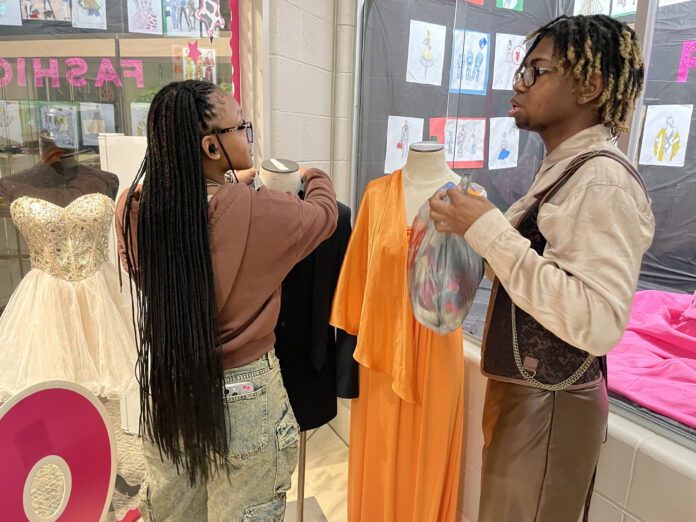

Start High School hosts former attire dress sale for homecoming, prom seasons
TOLEDO – A bright orange, long dress with a sari-style top is among the hundreds of dresses senior Raniyah Rogers and her classmates at Start High School have prepped ahead of a formal attire resale.
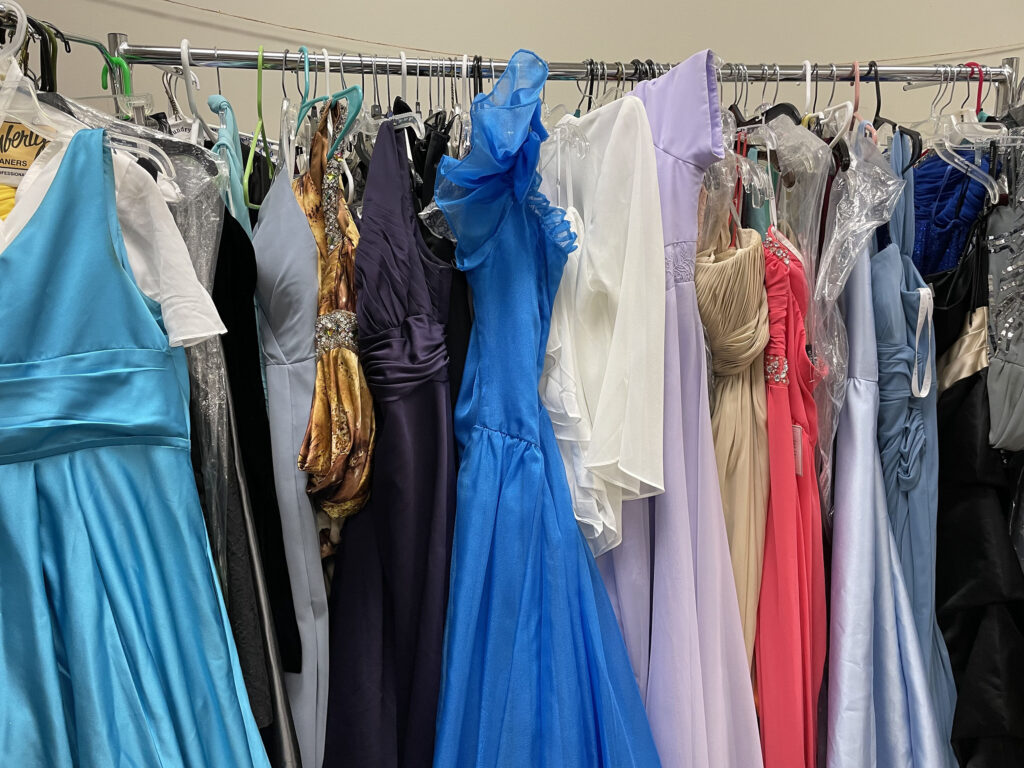

The My Sister’s Closet dress resale officially takes place twice a year, just ahead of the high school homecoming and prom seasons. It is hosted by Start Fashion Marketing – DECA II Club as a fundraiser for club projects and trips, such as attending a sewing and quilt expo later this fall at Suburban Collection Showplace in Novi, Mich.
The fashion marketing students and their teacher, Robinetta West, gave a show and tell ahead of the sale on Wednesday to news media.
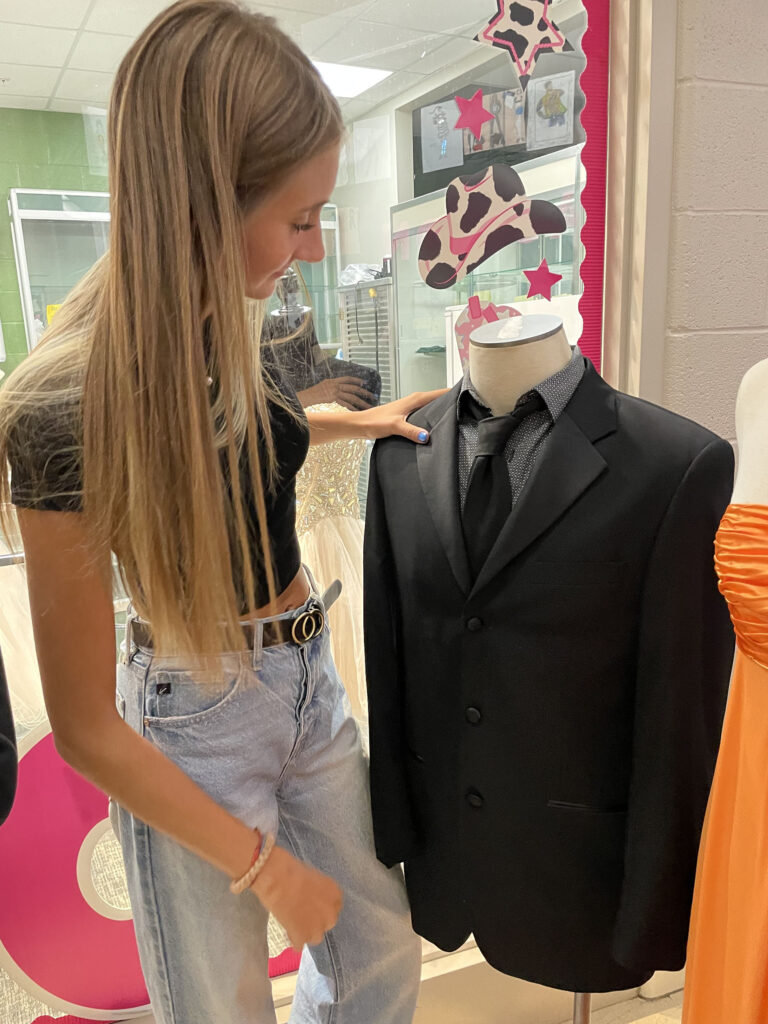

Sorting and other preparations had been taking place for days, Raniyah said, although the students got somewhat of a head start in the spring.
“We get to organize the dresses, try them on,” senior Samantha Zadrazil said about the preparation time.
While Start’s fall sale is early this year, so are some of the dances. Start High School, for example, will host its homecoming on Sept. 28 with the theme of Bollywood.
In the meantime, West said the resale will expand this year into a year-round opportunity, with pictures of formal attire to be posted on the school’s website that can be purchased between the in-person sales.
“We’re always looking for donations,” West said. Gently-used formal attire, such as dresses, shoes, suits and ties are accepted in all styles, sizes and lengths.
Memorable pieces donated this year include bright yellow stiletto heels and a gown that was clearly a wedding dress. Start senior Kristian Woods-Boykin said someone even donated a pair of Kade Spade brand shoes.
Raniyah said “old is the new” among today’s high school girls who like fashions from the ’80s and ’90s; and Kristian gave a mention to Regency-era styles inspired by the show Bridgerton.
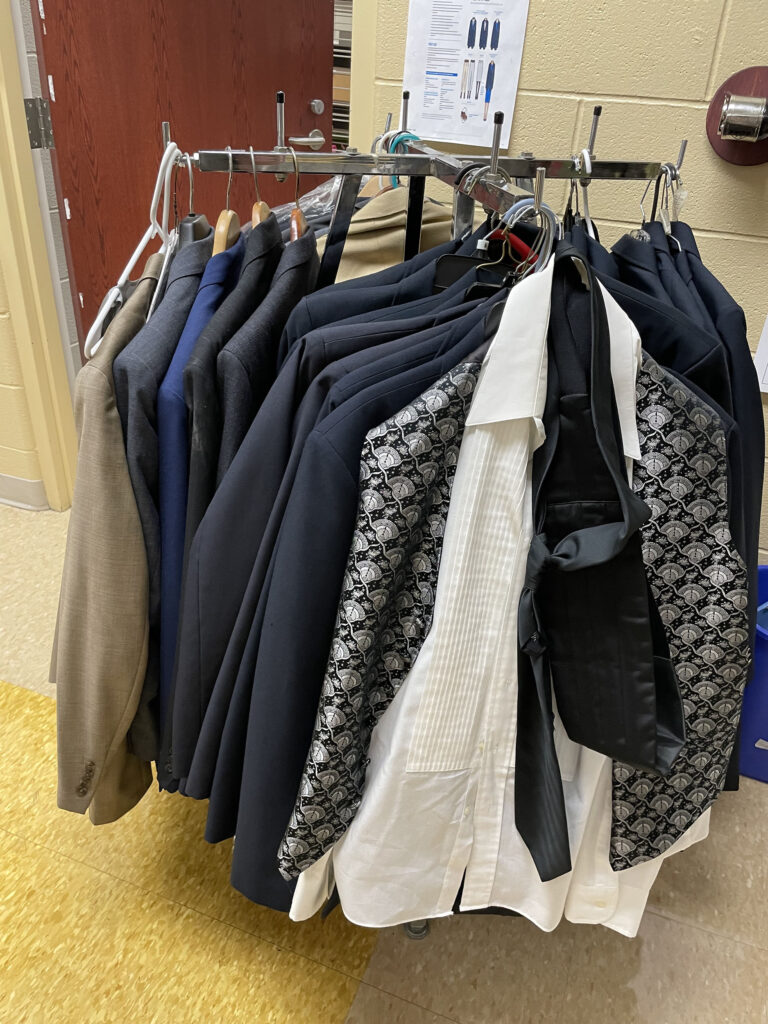

However, high school boys tend to favor modern and trendy formal attire. With that in mind, the DECA students tried different combinations of a shirt, tie, vest and jacket on a display mannequin as they considered how to present such a look.
“Always take a risk,” Kristian noted about the options.
By the way, the mannequins were donated as well.
The intent of the resale, in addition to practical experience for students who are considering retail or fashion careers, is to provide area high schoolers with affordable, special occasion attire.
It’s not just students from Toledo Public Schools who benefit. Over the years, shoppers have come from Whitmer High School in Washington Local School District; St. Ursula Academy and Central Catholic High School in Toledo; and State Line Christian School in Temperance, Mich. Shoppers also come from Defiance, Findlay and even Akron.
Sale date and time
The My Sister’s Closet sale takes place from 10 a.m. to 4 p.m. on Saturday and Sunday, Sept. 7-8 in the main lobby of Start High School located at 2010 Tremainsville Road in Toledo.
Dresses sell for $25 each, with varying prices on other attire. Cash only.
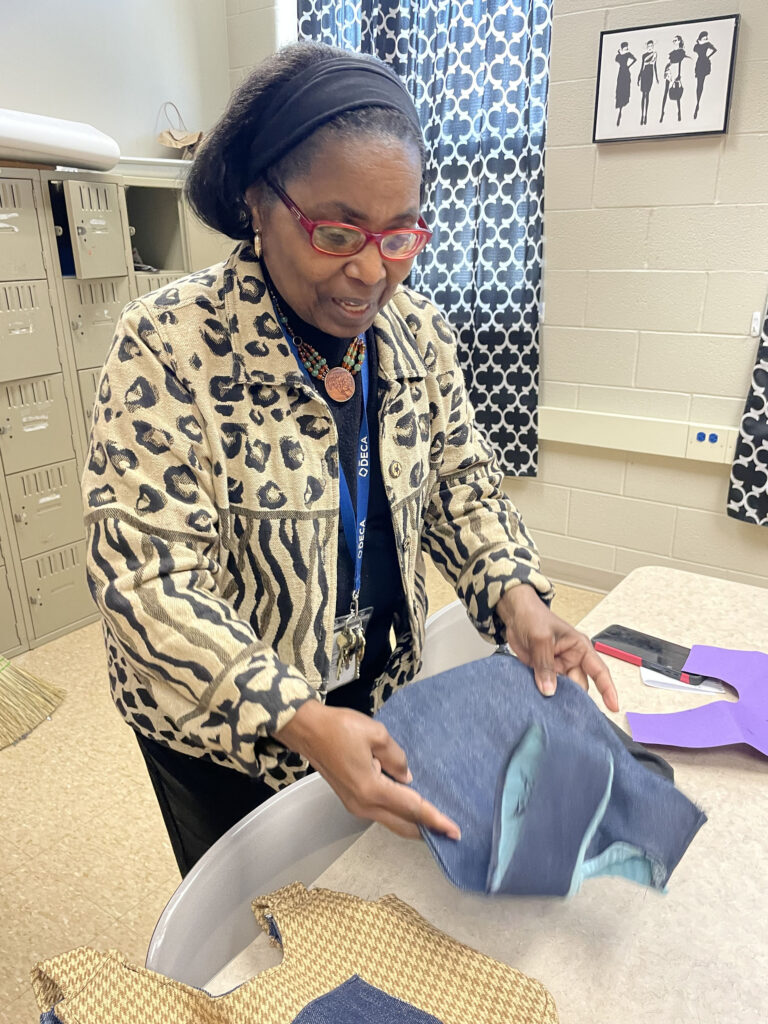

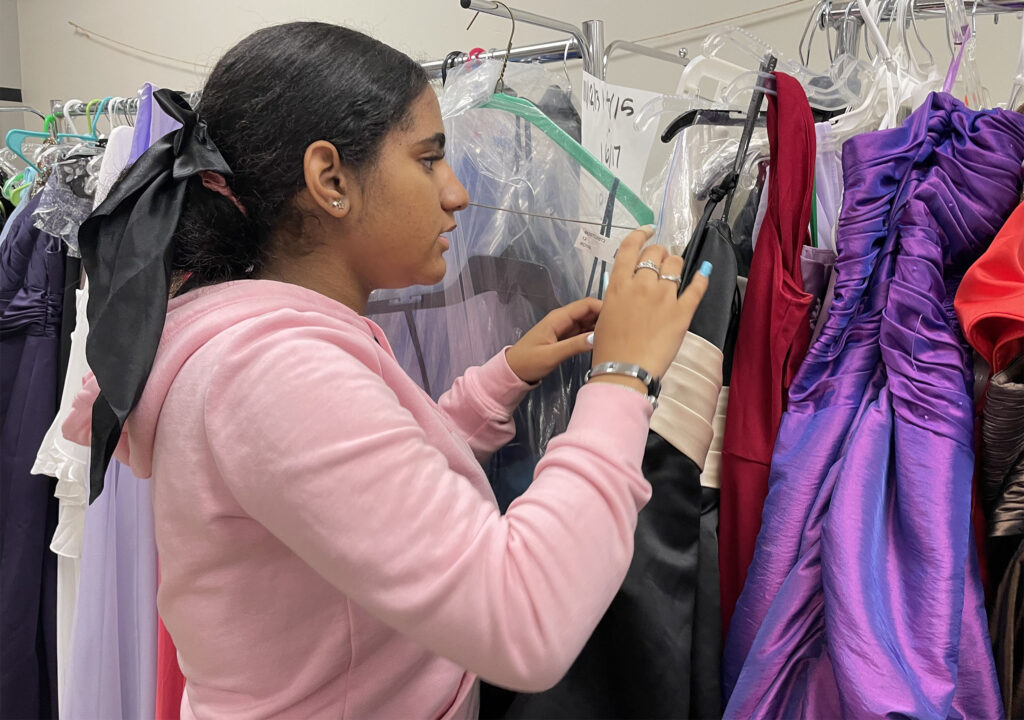

‘Belonging’ vs. ‘Othering’
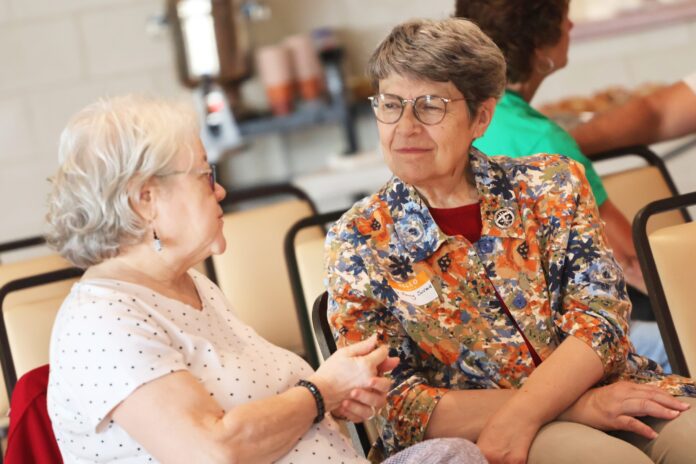

Program gives residents tools to bridge divides in community
SYLVANIA – How do you interact with people who don’t think the same way you do?
In a deeply polarized society, there is a growing tendency to avoid hard conversations, to categorize others by their politics or other group affiliations, to “unfriend” or “snooze” the people with whom we disagree.
Mike Linehan saw it at his family reunion over the summer. “We all huddle in our own safe little camps of thought. We exchange pleasantries in the beginning and the end of the reunion, and nothing happens in between,” said Linehan.
Linehan and about a dozen others attended a workshop Aug. 24 in Sylvania to learn about Bridging to Belonging, a program to empower communities to create spaces where every person belongs and contributes together.
The MultiFaith Council of Northwest Ohio hosted the event at Olivet Lutheran Church to introduce the program that was originally developed for the InterFaith Leadership Council of Metropolitan Detroit.
Donna Mens, a member of the MFC and Olivet Lutheran Church who attended the workshop, expressed interest in gaining the tools to effectively listen to people who have different opinions.
“I feel the polarization, especially politically right now, and it is so emotionally charged,” said Mens. “So how do we bridge that? How do we listen to each other, and what people’s thoughts and values are without that defensiveness and that emotion?”
Rachel Cannon, a psychologist specializing in organizational development and behavior and co-creator of Bridging to Belonging, spoke on the science of belonging. She explained how the program helps participants learn to build genuine connections with people from groups outside their comfort zone.
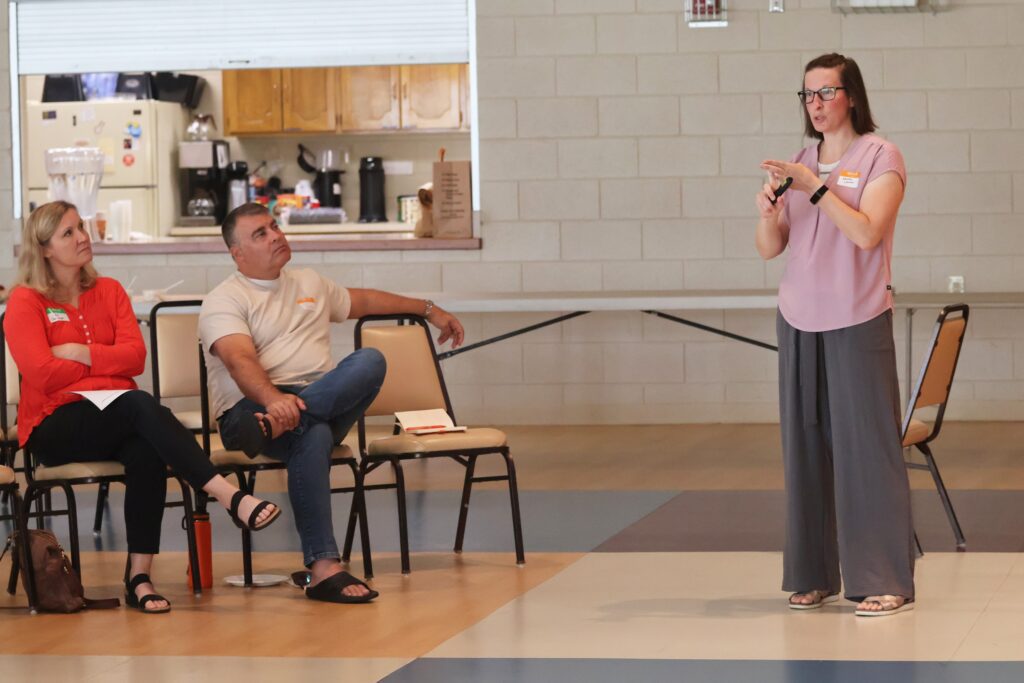

The opposite of belonging is “othering,” Cannon said. This emphasizes the differences between groups of people and can often lead to extreme forms of hate. Whether looking at race, faith, age, socio-economic status or another characteristic, “othering begins simply when you flatten someone’s identity and only see one aspect of who they are,” said Cannon.
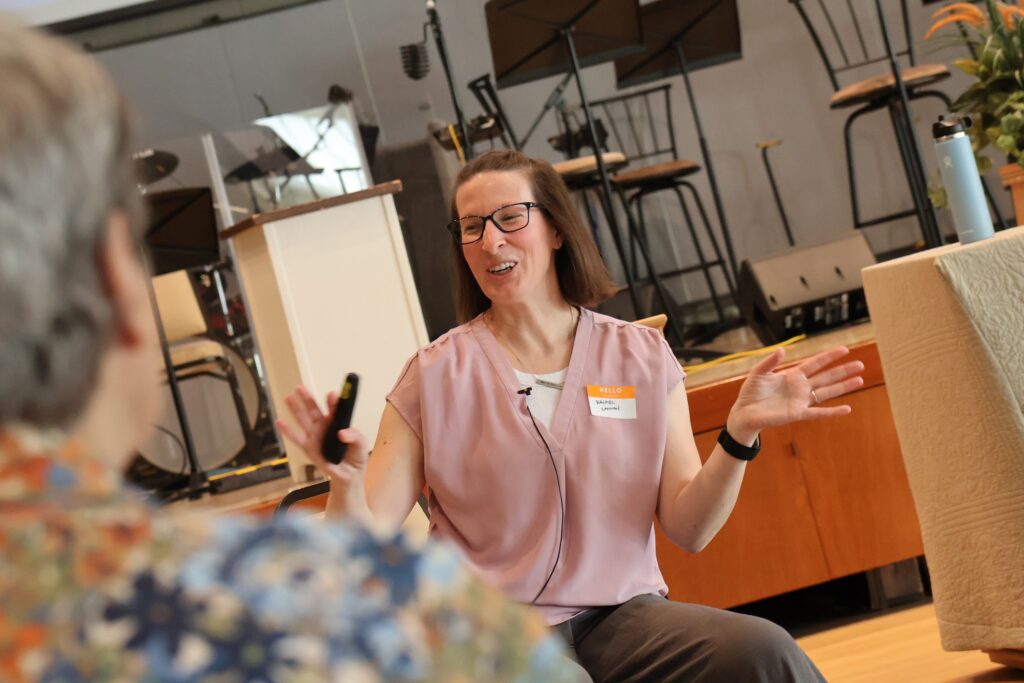

According to Cannon, humans naturally do this as a way of trying to explain the world around them. “We see one thing that happens, and we try to fill-in the rest of the story,” she explained. “The challenge for us is, can I stop my natural tendency and can I become more curious?”
Cannon cited research from the nonprofit More in Common that revealed Americans often have a distorted understanding of what people on the other side of the political aisle really think. “Our sense of division, our sense of polarization, is really truly about perception,” she said. “The gap between where, say, Democrats are, and where Republicans think they are, is very big … and vice versa.”
This perceived polarization “leads us to viewing others as a problem, because we think we know the story,” added Cannon. “So our efforts are focused on others rather than starting with ourselves.”
Bridging to Belonging started several years ago in the wake of the pandemic, and Cannon estimates a couple hundred people have participated in the Detroit area.
Diverse groups consisting of six to eight people meet four times over the course of eight weeks to share stories, and explore their values and dialogue on how to collaborate. They also view online learning modules between meetings to learn skills they can practice to foster belonging and build bridges between different groups.
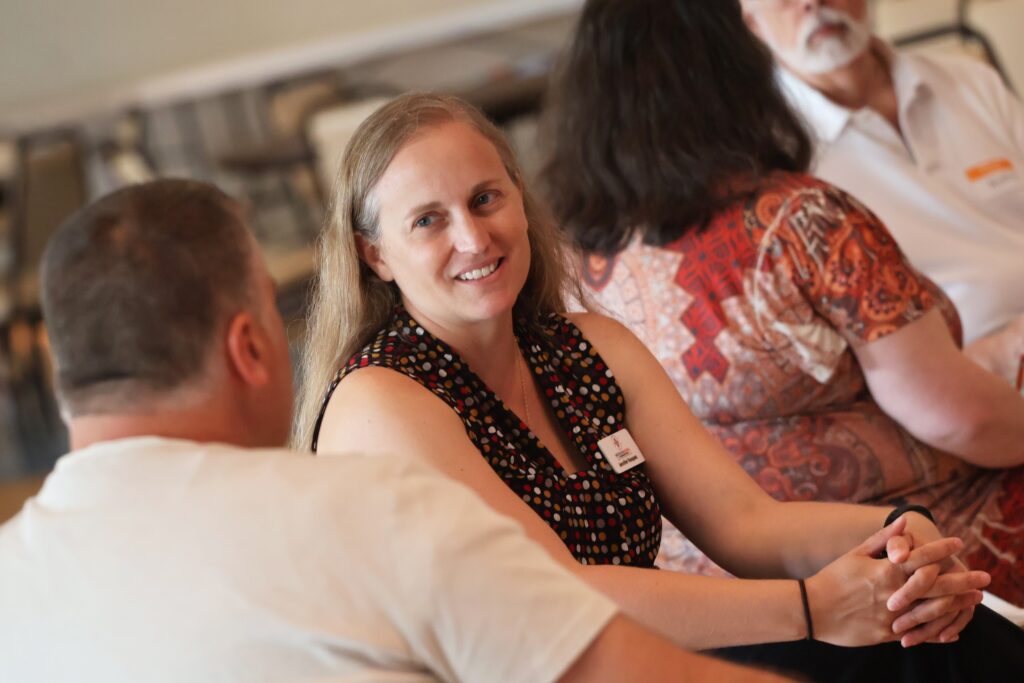

Jennifer Vasquez, executive director of the MFC, said the next step is for a small local group to train as moderators by going through the eight-week program together this fall. Once they complete the training, the plan is to begin forming other groups in the Toledo area.
“We’re hoping that other organizations and faith communities, and maybe even businesses, might be interested in going through the process and then apply the skills they learn to the work they’re already doing,” said Vasquez.
Cannon said the real impact of the program is measured by the “ripple effect” individuals have on the people around them.
“We might think that ‘I’m just one person,’ but you have connections to many different communities,” she said. “You don’t need to be the bridge to everything — the ones where you already have connections is where you start.”
In celebration of neighbors
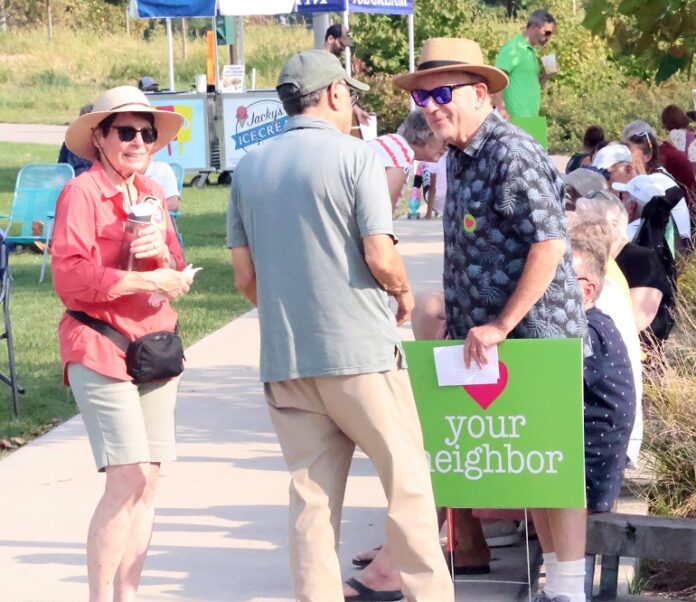

Initiative urges residents to put neighbors before politics
TOLEDO – Green signs emblazoned with a large magenta heart atop the words “your neighbor” led visitors to the Glass City Metropark pavilion for food, children’s activities and a concert featuring crowd-pleasing hits from the last several decades.
The free community party on Aug. 25 was put on by Neighbor to Neighbor Toledo, an initiative urging residents to show care for their neighbors — especially in the discordant months leading up to a hotly contested presidential election. Originating earlier this year at St. Michael’s in the Hills Episcopal Church, the effort has gained momentum, with at least 40 churches, businesses, organizations and institutions signing on as community partners.
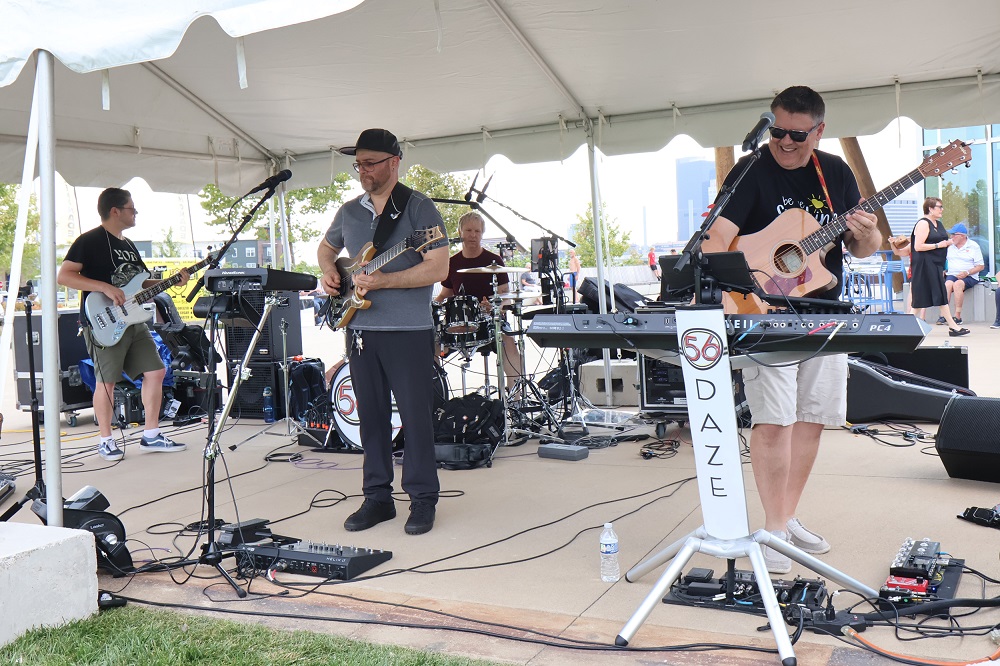

“Our tagline at St Michael’s is ‘love, learn and serve.’ So we thought we would create a series of events that would embody those things in terms of neighboring,” said The Rev. Gayle Catinella, rector of St. Michael’s.
“The first thing we decided to do is have a party because you can’t be mad at people if you’re dancing and singing next to them, right?” she asked.
Not everyone who showed up knew about the party in advance, but a good time was had by all, and many left with additional green yard signs tucked under their arms. The group is on its second round of signs after distributing the first 1,000 in just two weeks earlier this month.
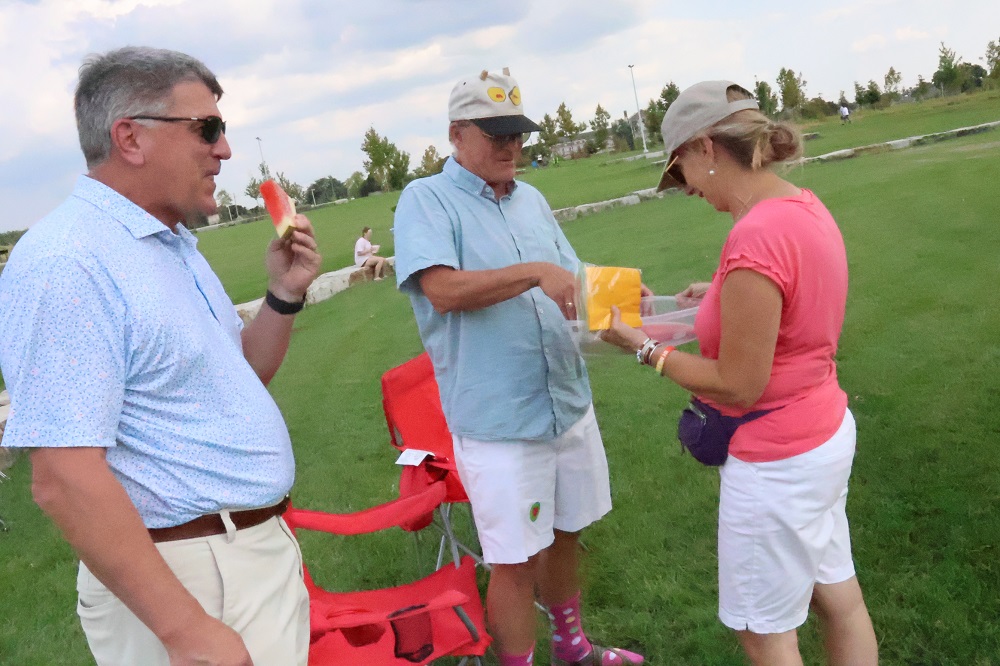

“We just want people to come together, have a good time and have a sign in their yard. That is a very concrete way of saying ‘let’s love each other and get along as neighbors,’ ” said Steve Wipfli, the sign’s designer and a member of the initiative’s original planning committee. “It’s satisfied a thirst that people have for a lower temperature during the political season.”
The colors red and blue were purposely avoided in the sign’s design, as was the mention of a specific church, Wipfli noted.
Spreading positivity
As neighbors on the opposite ends of the political spectrum, Carol Nichols and Dave Karmol have put up competing political signs in their west Toledo yards for years.
“He tells his friends that he knows any time he puts a yard sign in, that the Nichols’ will have the opposite the next day,” Nichols said of her neighbor.
“And by the way, he’s right,” she added with a laugh.
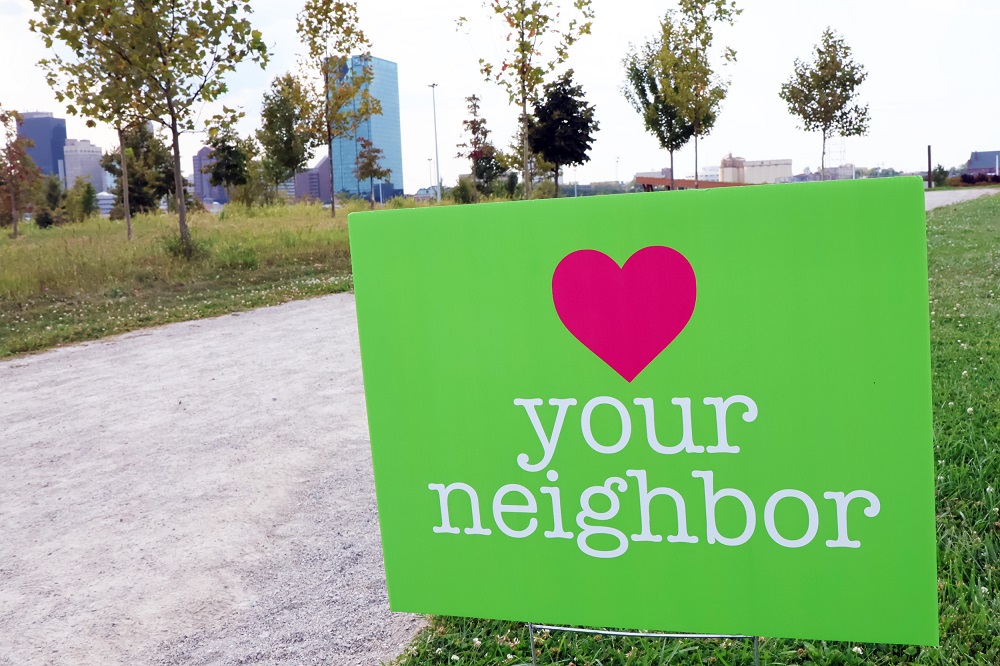

The tense political divide reflected in this back-and-forth is what led Nichols to approach Catinella in January to ask if the church could do something to bring people together, especially during election season. Her pastor responded positively to the notion, they formed a committee at St. Michael’s, and Neighbor to Neighbor Toledo was born earlier this year.
“There’s a tradition in every faith, every denomination about loving your neighbor, caring for your neighbor, being a good neighbor. We thought that might be a thing people can relate to that’s positive and hopeful,” said Catinella.
We’re not trying to change our neighbors. We’re trying to change ourselves and become the people that we want everyone else to be.
Gayle Catinella
Looking around the gathering at Glass City Metropark, Amichai Stout said the initiative was an easy cause for the Jewish Federation of Greater Toledo to support as a community partner.
“This is the right message — make connections that are genuine. Look past the labels, right?” said Stout, who serves as director of the Jewish Community Relations Council. “Look past whatever you identify with religiously, politically, and just spread the positivity and love for everyone.”


As for Nichols and Karmol, both were in attendance on that Sunday and they now share at least one yard sign in common. Karmol said his Catholic parish, Christ the King, also joined the initiative as a community partner after he brought it to the attention of his pastor.
They still disagree on politics, but Nichols and Karmol describe each other as good neighbors. “While we do have significantly different views and opinions, I think everybody wants to be a good neighbor, and everybody wants to live with a good neighbor. It’s just decency,” said Nichols.
Neighbor to Neighbor Toledo has several more events planned leading up to the election. On Oct. 8, nationally-renowned commentator and columnist David Brooks is to speak at Lourdes University about his book, How to Know a Person. Tickets are expected to go on sale Sept. 1. Catinella says Brooks will touch on the themes of being a good neighbor and listening to the stories of others.
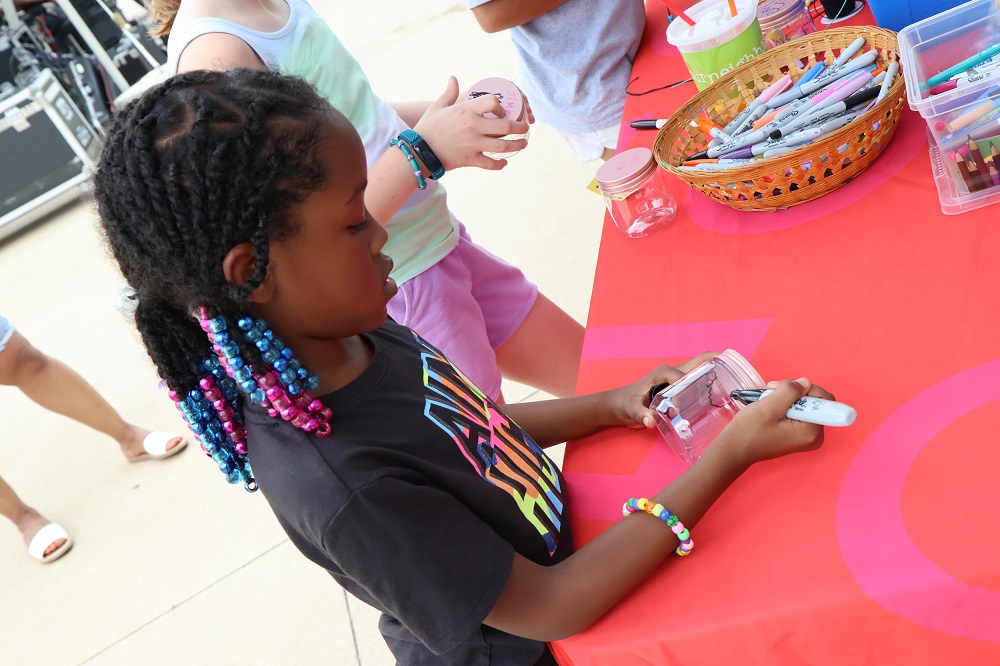

Organizers are also asking residents to participate in a week of “intentional acts of kindness” by performing small, positive neighborly actions from Nov. 1-5. After the election, the MultiFaith Council of Northwest Ohio is co-sponsoring a dinner to promote healing, fellowship and reflection. The event is planned for Nov. 17 at Glass City Metropark.
Election Day “doesn’t have to be the disaster the everyone is predicting. It doesn’t have to be violent. It doesn’t have to be scary. It can be a lot of people trying to do some good things for each other, because when this is over on Nov. 6, we will still be neighbors,” says Catinella.
She marvels at the support and generosity the initiative has received from the community since it began.
“We never expected it to be what it’s become, but I can tell because of what it’s become that it’s a good thing,” Catinella said.





